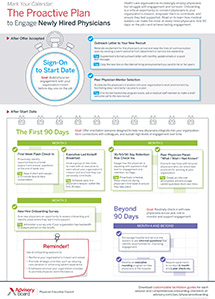Auto logout in seconds.
Continue LogoutEditor's note: This popular story from the Daily Briefing's archives was republished on Feb. 10, 2020.
Medical students' facial attractiveness might affect their chances of landing a residency slot in radiology programs, even more so than their grades, class standing, and extracurricular activities, according to a study published in Academic Medicine
Learn the 4 requirements for successful physician recruitment in today’s competitive market
Do looks matter in medicine?
Appearance-based discrimination is common in many fields, but according to Charles Maxfield, vice chair of education at Duke Radiology, appearance-based bias should have no place in the medical field.
To determine whether medical residency programs discriminate against applicants who are facially unattractive, researchers at Duke University created 76 fake residency candidate profiles and submitted the applications to 74 reviewers for the radiology programs at Duke, Stanford University, Indiana University, Mayo Clinic, and the University of New Mexico.
The researchers randomly assigned names and demographic information to the applications, as well as pictures that represented a "pre-specified distribution of facial attractiveness and obesity," according to a Duke University release. The researchers also randomly assigned other factors—including class rank, grades, and test scores—to each application.
According to the release, reviewers thought they were assessing real residency program candidates.
Facial attractiveness is a strong predictor for medical students' success
The researchers found that the fake applicants' facial attractiveness strongly predicted whether they would be selected for an interview to get into the medical residency programs.
In fact, the study found facial attractiveness was a stronger predictor of a positive rating than an applicant's individual race/ethnicity, class rank, clerkship grades, or perceived weight. According to the researchers, applicants who were obese and facially unattractive were half as likely to receive an interview as other applicants.
However, the researchers noted that the strongest predictor of an applicant's reviewer score was their United States Medical Licensing Examination score.
Results are 'unfortunate' and 'unjustified,' researchers say
Maxfield, the lead author of the study, said the findings are "unfortunate and potentially could keep some of … the best potential doctors out of the field."
Maxfield also said the results were surprising, adding that there is no explanation for the findings. "In the business world there are studies that more attractive people are actually more successful … but in higher education or in medical school there's really no justification for it," he said.
Maxfield said he believes the findings would not be limited to radiology resident selection. However, he said removing the photograph requirement from residency applications likely not would eliminate the bias, because applicants still would have to attend in-person interviews. Instead, Maxfield said, "Admissions decisions-makers throughout higher education should consider any potential appearance-based bias they may hold, and invoke strategies to manage that bias" (Gulledge, Triangle Business Journal, 6/5; Duke Health release, 6/4).
Win the war for physician talent
Physician recruitment is not a new problem. But generational changes and rising expectations for physician performance make competition for physician talent feel increasingly intense today.
Though recruitment challenges are deep-rooted, organizations can take steps to ensure their physician recruiting process is as effective as possible. Read the report to learn the four requirements for successful recruitment in today’s competitive market.
Don't miss out on the latest Advisory Board insights
Create your free account to access 1 resource, including the latest research and webinars.
Want access without creating an account?
You have 1 free members-only resource remaining this month.
1 free members-only resources remaining
1 free members-only resources remaining
You've reached your limit of free insights
Become a member to access all of Advisory Board's resources, events, and experts
Never miss out on the latest innovative health care content tailored to you.
Benefits include:
You've reached your limit of free insights
Become a member to access all of Advisory Board's resources, events, and experts
Never miss out on the latest innovative health care content tailored to you.
Benefits include:
This content is available through your Curated Research partnership with Advisory Board. Click on ‘view this resource’ to read the full piece
Email ask@advisory.com to learn more
Click on ‘Become a Member’ to learn about the benefits of a Full-Access partnership with Advisory Board
Never miss out on the latest innovative health care content tailored to you.
Benefits Include:
This is for members only. Learn more.
Click on ‘Become a Member’ to learn about the benefits of a Full-Access partnership with Advisory Board
Never miss out on the latest innovative health care content tailored to you.


